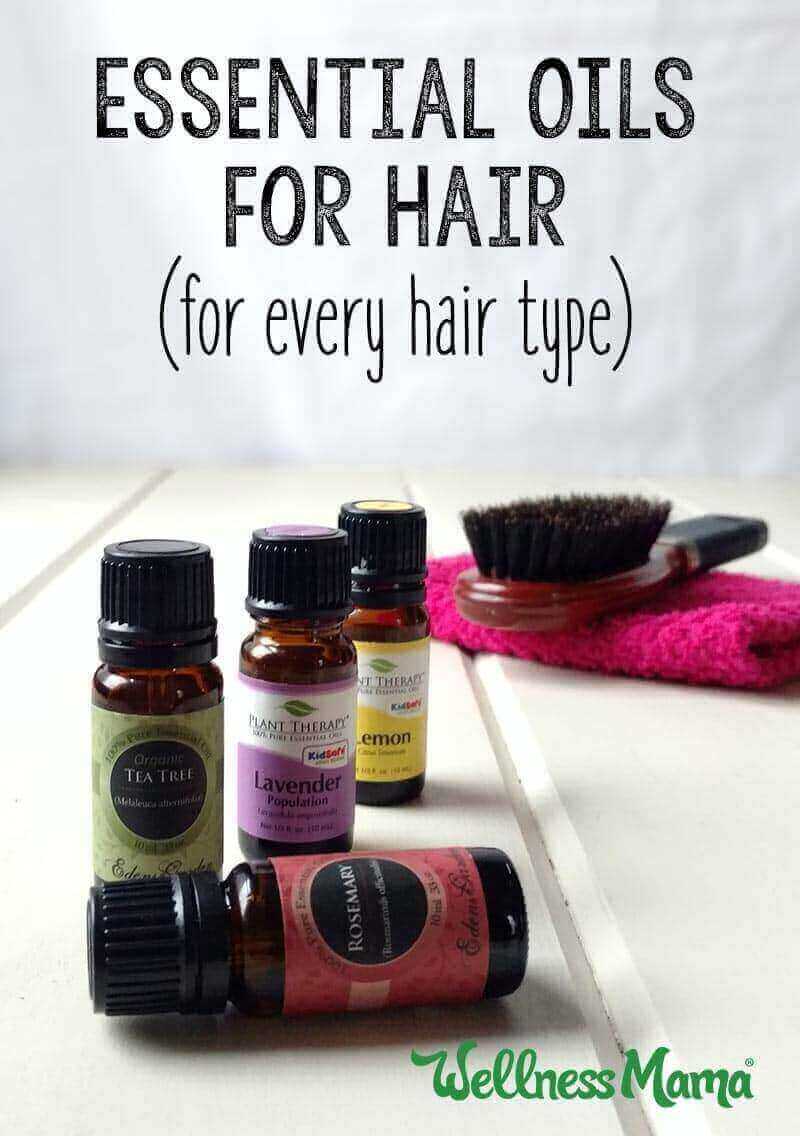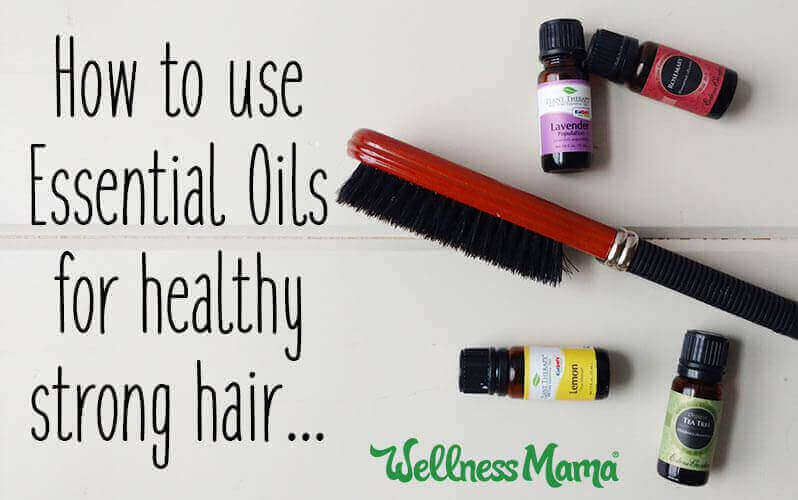Maybe you ditched conventional haircare products years ago, or maybe you’re exploring more natural options. Whatever the case may be, essential oils for hair can be an integral part of everyone’s natural routine. Over the years I’ve found some favorite essential oils proven to strengthen and improve my hair, and they smell great too!
Best Essential Oils for Hair
I’ve always been careful to use essential oils safely and not ingest them unless suggested by a healthcare provider, but I love using them topically. Using them in my hair is one more way to get the benefits of essential oils safely.
A caution along these lines: Always dilute essential oils in the appropriate ratio in a carrier oil (or a beauty product containing oils) as essential oils do not dilute in water. The resources section in this episode of the Wellness Mama podcast gives several helpful charts as a guide.
Remember, it isn’t good to put straight essential oil directly on the hair or scalp, ever.
That being said, here are a few of my favorite essential oils for hair!
1. Ylang Ylang
This floral essential oil (I like this one) has aphrodisiac properties and a strong, distinct odor. It may be too overwhelming to use on its own, but it combines well with other essential oils for hair, like lavender and even lemon. People have been using ylang ylang to help grow their hair for a long time, as it was a popular hair growth remedy in Victorian England. This essential oil works by stimulating hair growth to treat thinning hair and also stimulates production of our scalp’s natural sebum to nourish dry, damaged hair.
Ylang ylang also offers aromatherapy benefits, as it works to relieve stress in the body. Since stress can sometimes cause hair loss, using ylang ylang is a great way to kill two birds with one stone. And for little ones who are frequently around other children, ylang ylang can also help to repel lice.
2. Tea Tree
Tea tree is one of the most popular essential oils for soothing damaged skin, but it’s also great for scalp health. Since this essential oil is antifungal, it’s been successfully used to treat dandruff. In this study, there was a 41% improvement in the severity of the dandruff as well as in the symptoms of itchiness and greasiness. Tea trea was also shown in this 2013 study to slow hair loss and increase hair growth and appearance, without the itching and inflammation that the control group had. And like ylang ylang, tea tree oil also treats head lice.
3. Lavender
Lavender is another favorite essential oil for skin that doubles for hair care. This study found that lavender increased the number of hair follicles for a thicker head of hair. The hair follicles in the lavender group were also deeper, meaning stronger roots for less hair falling out. Lavender essential oil also showed significant help in hair growth in this study that used a combination of several different essential oils, all with no significant side effects.
4. Cedarwood
Many guys like cedarwood essential oil because of its woody, more masculine scent. So if the man in your life objects to using more feminine-smelling oils like lavender and ylang ylang, then cedarwood may be a good option. It stimulates the hair follicles and increases circulation to the scalp to combat thinning hair. Cedarwood has also been helpful at improving dandruff symptoms.
5. Rosemary
Rosemary works well for dandruff due to its ability to minimize scalp itchiness and flakes. It helps to treat both dry, dull hair as well as overly oily hair and can help prevent split ends. In this study, rosemary essential oil was found to be just as effective against balding as the conventional treatment when it was used for at least six months. It helps to prevent premature baldness and stimulates the hair follicles.
6. Lemon
As a citrus oil, lemon helps simulate circulation in the scalp for increased hair growth. It’s also helpful to reduce overly greasy hair. Since there is some concern for phototoxicity here, don’t slather your head in lemon essential oil and then go sunbathing. Use lemon at night (or at least twelve hours before sun exposure), or don’t use more than a 2% concentration. However, if you’re using a few drops in your shampoo then washing it out of your hair, there’s no concern for phototoxicity. I like this organic one.
7. Juniper
Juniper berry has a fruity scent to it and blends well with both lemon and cedarwood essential oils. It’s helpful for overly oily hair and helps strengthen brittle strands. Juniper berry’s antiseptic properties help fight scalp conditions, and its astringent properties tone hair follicles to prevent hair loss.
8. Peppermint
You’re probably familiar with the fresh, invigorating scent of mint. This study showed a blend with 3% peppermint essential oil in a base of jojoba oil significantly increased hair growth thickness and length and deepened hair follicles for stronger hair. (Peppermint oil can safely promote hair growth, but this essential oil isn’t safe to use on young children.)
9. Lemongrass
Lemongrass has potent antiviral and antifungal properties that make it useful for a variety of scalp issues. In this study, several hair tonics were compared, and the one with a 10% dilution of lemongrass had the best results against inhibiting dandruff caused by yeast.
How to Apply Essential Oils for Hair
- Add a few drops to your shampoo or conditioner and lather as usual.
- In all of the studies, results were seen after consistent use for at least six months. Most of the treatments were used daily until results were achieved.
- Add some essential oils diluted in aloe vera to a spray bottle and liberally mist your hair. You don’t need to rinse your hair after this. (However, be sure to avoid using citrus oils and then going out in the sun.)
- Dilute essential oils in a carrier oil and use as a leave-in deep conditioning treatment. After an hour, or even overnight, the oil can be washed out of the hair. Coconut oil and sweet almond both work well for a leave-in conditioning treatment. (If you’ve heard castor oil helps hair growth, bear in mind that this thick oil is hard to wash out unless diluted with other carrier oils.)
How to Do Scalp Massage with Essential Oils
You can do a scalp massage with essential oils for hair diluted in a carrier oil to help reduce the symptoms of dandruff, psoriasis, or stimulate the scalp for hair growth.
- Part the hair and apply the oil treatment to the scalp in sections.
- Take your fingers and press them firmly onto the scalp, moving the skin across the skull. Do not however allow your fingers to move across the scalp.
- Allow the oil treatment to stay on for at least an hour before rinsing/washing out.
Do you use essential oils in your natural hair care routine? Is it something you can see yourself trying?



Leave a Reply